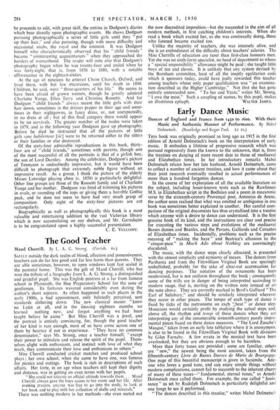The Good Teacher
Maud Cherrill. By L. A. G. Strong. (Parrish. 6s.) SAFELY outside the dark realm of blood, affection and possessiveness, teachers can do far less good and far less harm than parents. They are able sometimes, however, to open windows kept fast sealed in the parental home. This was the gift of Maud Cherrill, who has won the tribute of a biography from L. A. G. Strong, a distinguished and grateful pupil. She was English mistress at a far from famous school in Plymouth, the Hoe Preparatory School for the sons of gentlemen. Its fortunes wavered considerably even during the author's short sojourn. As often happened in such places in the early 1900s, a bad appointment, only belatedly perceived, sent standards slithering down. The new classical master "knew no Latin at all, and in the 'ensuing eighteen months we learned nothing new, and forgot anything we had been taught before he came." But Miss Cherrill was a jewel, and the portrait is entirely convincing, for, though the good teacher of her kind is rare enough, most of us have come across one of them by hearsay if not in experience. "They have no common denominator," says Mr. Strong, once a teacher himself, "except their power to stimulate and release the spirit of the pupil. Them- selves alight with enthusiasm, and instinct with love of what they teach, they communicate their love and enthusiasm to others " Miss Cherrill conducted cricket matches and produced school plays ; her own school, when she came to have one, was famous for picnics and outings. The book is rich in descriptions of such affairs. Her forte, in an age when teachers still kept their dignity and distance, was in getting on even terms with her pupils. "She could not tolerate an official attitude towards them... Maud Cherrill always gave the boys access to her room and her life. After evening prayers, anyone was free to go into the study, to look at her book and to play with her collection of shells and minerals."
There was nothing modern in her methods—she even meted out the now discredited imposition—but she succeeded in the aim of all modern methods, in first catching children's interests. When she read a book which excited her, as she was continually doing, those who listened became excited too.
Unlike the majority of teachers, she was intensely alive, and she is an embodiment of the difficulty about teachers' salaries. The Miss Cherrills of education are rarer than first-class honours men. Yet she was no sixth-form specialist, no head of department to whom a "special responsibility" allowance might be paid ; she taught little boys of ten and eleven. It is unlikely that any system devised by the Burnham committee, least of all the ineptly egalitarian code which it sponsors today, could have justly rewarded this teacher among teachers whose only paper qualification was "an examina- tion described as the Higher Cambridge." Not that she has gone entirely unrewarded now. "To her and Yeats," writes Mr. Strong, "I owe the most." Such a coupling of names, by this pupil, makes


































 Previous page
Previous page